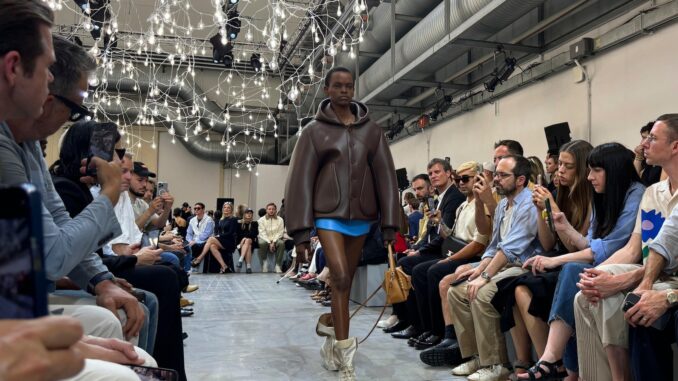
MILAN — Without making overt statements, Milan designers expressed their concern over the global turbulence through their collections.
Miuccia Prada said she wanted to project optimism.
“Because even if the times are bad, I feel that it was the right thing to do,” she said backstage at the Prada show. She is not promoting escapism. “Eventually, I propose something positive, but escapism, I don’t like.”
Not using the platform to comment on the state of the world would be “irresponsible,’’ said the designers behind the Simon Cracker brand, born 14 years ago to contrast the prevailing fashion system with upcycled collections.
They dedicated their collection, titled “A Matter of Principle,” to “the children victims of matters of principle.”
Some highlights from the third day Sunday of mostly menswear previews for Spring-Summer 2025:
The Prada menswear collection plays with the idea of imperfection. But nothing is as it seems.
Tops, jackets and hoodies seem shrunken, more than cropped. Overcoats have three-quarter sleeves. It’s a wardrobe somehow inherited, already lived-in. Creases are part of the construction, as technical as a pleat. Pointed shirt collars are held aloft by wires. Trousers feature faux belts, low and below the waistline. Belts also are featured as decoration on bags, as if to close them.
Miuccia Prada, co-creative director of the brand along with Raf Simons, said playing with the idea of the real versus the fake “is very contemporary,” calling such details “an invitation to take a closer look at the clothes.”
The neutral color palette is punctuated by feminine shades: a bright green cardigan, a floral blouse, a turquoise coat, which the designers said suggest a mother’s or grandmother’s wardrobe. Pieces can be lined up with inverted triangle cutouts, to layer.
“We wanted (the collection) to be already alive, as if clothes you already lived with,” Simons said backstage.
Prada models emerged from a simple white hut, descending into the showroom down a runway flanked by a white picket fence. The designers describe the setting both as essential and utopian — and youthful.
“Here youth is the hope, it’s the future,” Prada said. “In this moment, we thought it was relevant also to encourage youth to think about our world.”
So many knots to undo in the world, so many knots holding together the latest Simon Cracker collection of mostly upcycled apparel.
For Spring-Summer 2025, designers Filippo Biraghi and Simone Botte assembled their collection of repurposed apparel castoffs using laces and drawstrings to create skirts from tennis shirt panels, dresses from knitwear and restructure jackets. Each piece is unique.
The “nervous” color palette of black, violet, sea blue and acid green was achieved through dyeing, each material reacting differently to the process.
“It is a way of recounting what is happening in the world, without being too explicit,” Biraghi said backstage. “It would be irresponsible to not be political in this moment.”
The 14-year-brand’s name is meant to denote that something is broken — cracked — in the fashion system. They embrace imperfection as part of the beauty of their creations, made from forgotten or discarded garments and deadstock fabrics, this time including textiles from Italian sportswear brand Australian.
Australian, which is gaining traction with the club crowd, also created a capsule collection of black neon and technical garments for Simon Cracker, its first production line. Doc Martens provided the footwear, which the designers personalized with pins, badges and costume jewelry.
JW Anderson’s warm weather collection for men and women cocoon the form in soft and spongy outerwear — a counterintuitive choice on warming planet. The collection’s seeming motto, on jackets, sweaters and T-shirts, Real Sleep, might be read as a recipe to cope with the real world.
The humorful collection played “with this idea of miniature scale and maximum scale,” the Northern Irish designer said after the show. It opened with oversized quilted jackets and transitioned into big cashmere balls of yarn, each in triplicate.
On the miniature side, Anderson recreated Georgian terraced houses and country cottages on the front of knitwear, with intarsia doors and windows.
Pillowy sweatshirts looked structural enough to break a fall. Big colorful silken balloon like structures on coats were deflated, as if to say the world is too much. And if so, take comfort in a smiling pint of a Guinness, the Irish stout is featured in a capsule collection with whimsical images of a last-century advertising campaign on knitwear.
Anderson said he was exploring “the idea of permissiveness with the clothing. This idea of what we do best is the storytelling.”


Be the first to comment